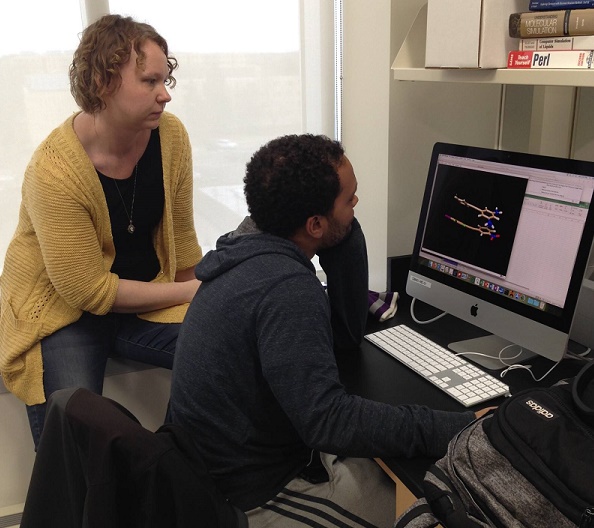Excellence in Teaching Award – Erin Speetzen, chemistry
 An associate professor of chemistry at UW-Stevens Point, Erin Speetzen's own university experience was as a first-generation college student from a small town. She remembers how it felt to walk into her first class, which had more students than in her entire high school class.
An associate professor of chemistry at UW-Stevens Point, Erin Speetzen's own university experience was as a first-generation college student from a small town. She remembers how it felt to walk into her first class, which had more students than in her entire high school class.
"I remember meticulously planning how to get from one end of campus to the other in the ten minutes I had between classes, and the panic I felt when I walked out of the wrong door of the science building and instead found myself completely and utterly lost," she says. "But most of all I remember what it felt like to be a scared college freshman and to have my chemistry professor stop me in the hall to ask me how I was doing – and call me by my name! I was so fortunate as a student to be surrounded by professors who cared about and encouraged me. It has always been my goal to pass that forward to my students."
Recently honored with an Excellence in Teaching Award, Speetzen summarizes her teaching philosophy as such:
- Teach the students you have, not the students you want. "Students come to my classes with different goals, interests, motivations and responsibilities," she says. "My job as a professor is not to force my students to live up to my expectations, but to help them live up to theirs."
- To learn chemistry, students must do chemistry. "No matter what you're trying to learn to do, whether that's chemistry or a new hobby, skill or sport, you have to go beyond passively absorbing information and actively practice new skills."
- Failure is part of learning. "I frequently remind students that it is okay to be confused or have questions when learning new material, and that doing poorly on an assessment is a reflection of how well they knew the information on that particular day, not their self-worth."
- Turn to the literature. "I am fortunate to be in a field with a rich educational literature. I have been able to use this literature to better get a handle on the emerging trends in my field, which instructional methods have evidence to prove they work, what criteria we can use to help identify students at risk of doing poorly, and most importantly how to help those students succeed."
- Learning is built on trust. "I work to build relationships with all of my students so that we can build the trust they need to come to me with their questions and issues."
By all accounts Speetzen is succeeding at these goals.
"Dr. Speetzen is so patient," said chemistry minor Katie Duffy. "She met me on my level every day and never got frustrated with me for struggling to understand a concept. She is one of the most approachable professors I've ever had. She cares about us. We are not just students passing through her classroom."
See also:
Excellence in Teaching, Scholarship and Service Award - David Barry
Carolyn Rolfson Sargis Award - Tina Rajski
Excellence in Teaching Award - Lauren Gantz, Kyle Herrman, Kate Kipp
University Scholar Award - Chris Diehm
University Service Award - Jennifer Collins, Shelly Janowski, Kathryn McGarry
Outstanding Work Performance Award - Janette Baumann, Corinna Neeb, Lisa Nelson, Heather Springer
